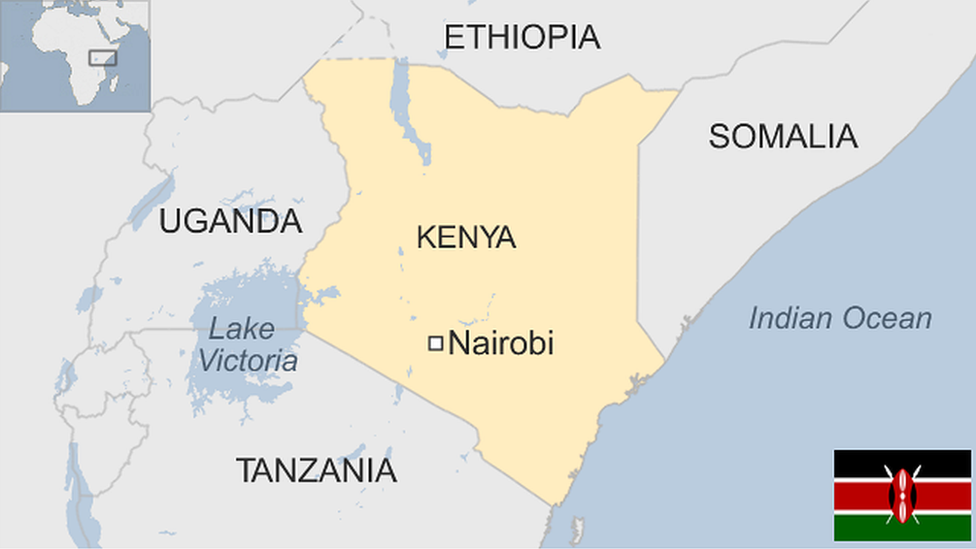What Kenya's chaotic primaries tell us about August election
- Published
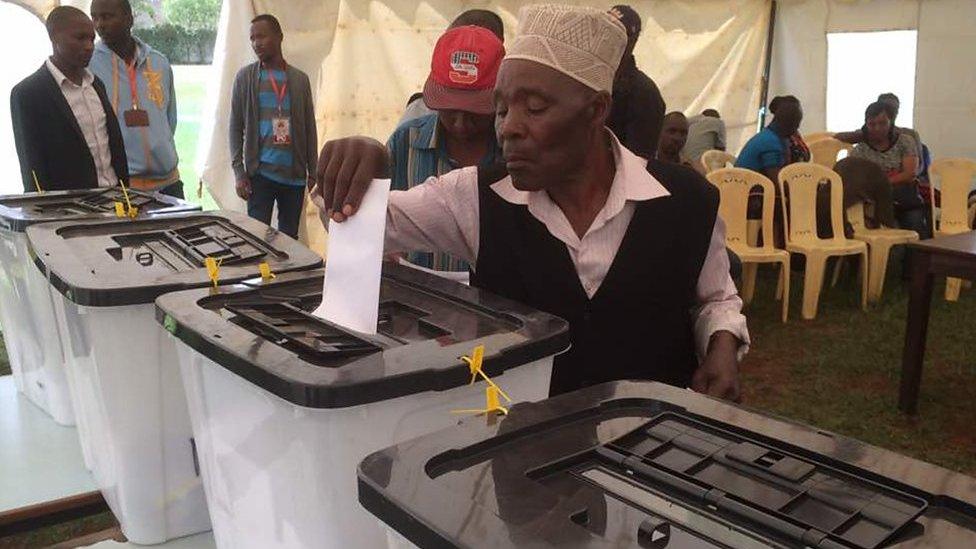
Political parties in Kenya have been holding primaries to choose the candidates who will represent them in the general elections. The BBC's Dickens Olewe looks at why the exercise has been marred by violence in some regions and what it means for the August elections.
"I did not kidnap myself," says Kabete MP aspirant Chege.
That was the headline on 18 April in Kenya's Star newspaper after Mr Chege, a candidate in the party primaries in the capital, Nairobi, who had been reported missing days earlier, was found in Narok town, west of the capital.
Media reports say his car was found in a ditch with two bullet marks on one of the doors.
He has been accused of stage-managing his disappearance to get sympathy votes - a claim he denies. Police are currently investigating the incident.
Another aspirant Isaac Mwaura alleged that his political rival had tried to assassinate him after an incident in which he says that gunshots were fired at his car: "A bullet has pierced my left ear and my car was sprayed [with] bullets," he posted on his Facebook page.
A photo of him, heavily bandaged on his left ear, was shown on local TV stations and widely shared on social media. He too, was accused of seeking sympathy votes.
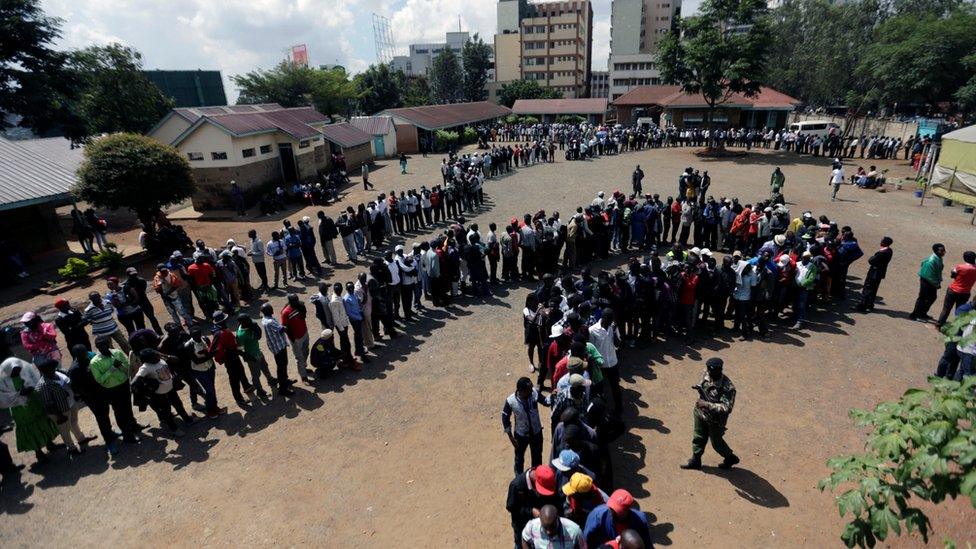
There were long queues of people to vote in the primary elections
In another incident, armed men with machetes and whips are seen disrupting a nomination exercise in Migori County in western region. They are seen attacking party officials, accusing them of planning to rig the exercise.
They then chase them out of the compound of a local school where the exercise was taking place. Police later made 17 arrests and displayed the weapons they had confiscated.
So far at least two people have been reportedly killed nationwide following clashes between rival political groups and many more have been injured since the exercise kicked off on 13 April.
Election malpractice
The primaries, which end on 30 April, are solely managed by political parties, which have struggled with the logistics of holding an election.
Some of the problems have included delays in delivering voting materials to the right polling stations.
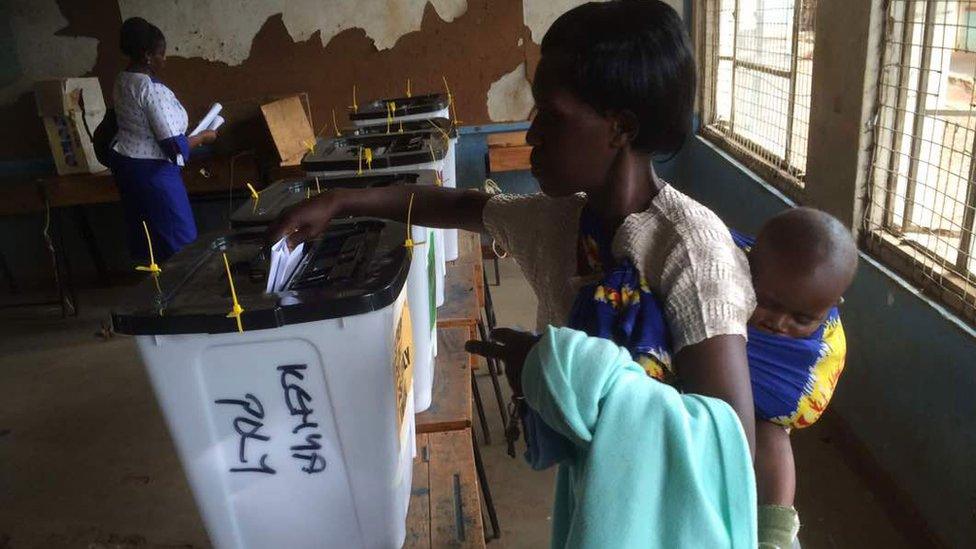
Some party members could not vote because their names were not on the party register
There have been accusations of planned rigging, with pre-marked ballot papers being intercepted.
Some party members have also not been able to vote because their names were missing in the party registers.
Faced with these challenges, the ruling Jubilee party was forced last Friday to cancel its nominations nationwide and ordered fresh elections.
The primaries of the main opposition party, ODM, have also been disrupted several times and in some cases party officials have declared more than one winner.
Ethnic parties
Kenyan journalist Christine Mungai says that the primaries have yet again exposed political parties' lack of strong internal structures and ideology.
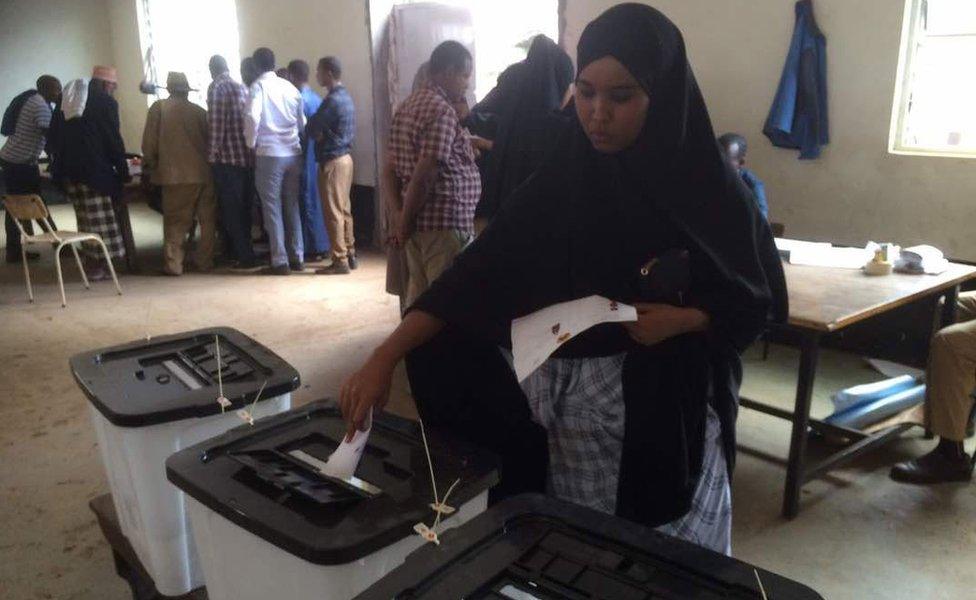
In some areas, the primary election is more important than the national poll
She says they are built around personalities and usually focus on ethnic mobilisation:
"The ethnic group is considered homogenous and there's really no reason to elevate the debate beyond that," she says.
"In most of these primaries, the organisation was so bad that the parties did not have a members' register so that they allow anyone, as long as they have a national identity card, to vote for their candidate.
"Basically what that says is that I can tell your political conviction simply by your ethnic community."
Competition for nominations has been particularly intense in parts of the country where the parties enjoy strongest support.
In such areas, the primary election is more important than the actual poll in August.
Why the competition?
In 2010, Kenya passed a new constitution which created a devolved system of government and new political seats.
There are 47 counties, headed by governors, which operate as semi-independent regions with their own county assemblies.
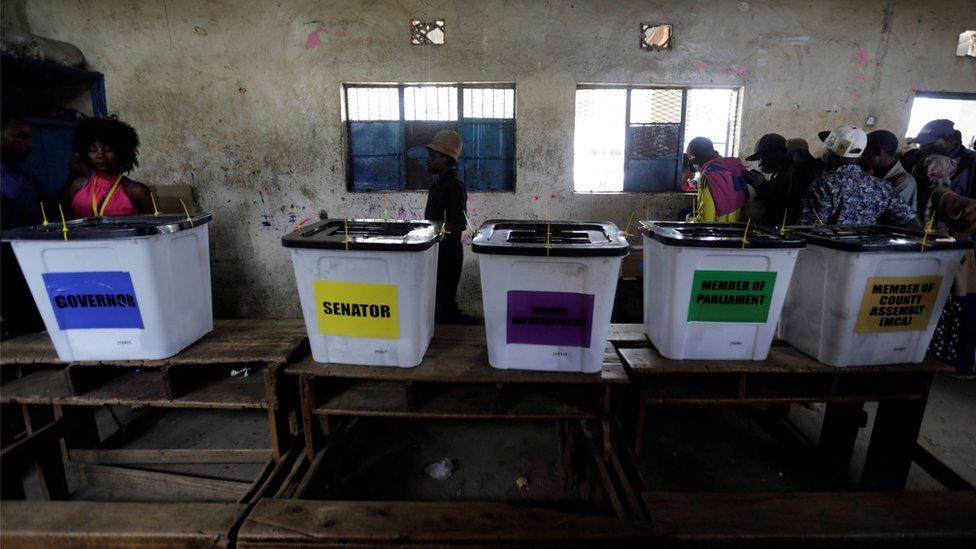
Party members chose their candidates for different positions at the same time
Apart from the MPs and senator positions, there are a total of 1,450 members of the county assemblies (MCAs) - a position that has attracted 12,748 aspirants nationwide, according to media reports.
The attraction to the seat is easy to see.
Ms Mungai writes in a recent commentary that the MCA position has widely, and accurately, been described as "lucrative".
On average, MCAs' basic salary is $2,400 (£1,800), without counting sitting allowances, foreign trips and other benefits. they take home in the region of ($4,800), 20 times the average income per capita, which stands at Kenya shillings 23,000 ($220).
She contends that this attraction to perks that come with the office is seen as a gateway to a better life. It is therefore a prize in some cases to be fought for and captured by any means possible.
Risk of violence in the general elections?
The violence seen in the primaries has rekindled memories of the 2007 post-election violence, which left more than 1,000 people dead and about 600,000 displaced from their homes.
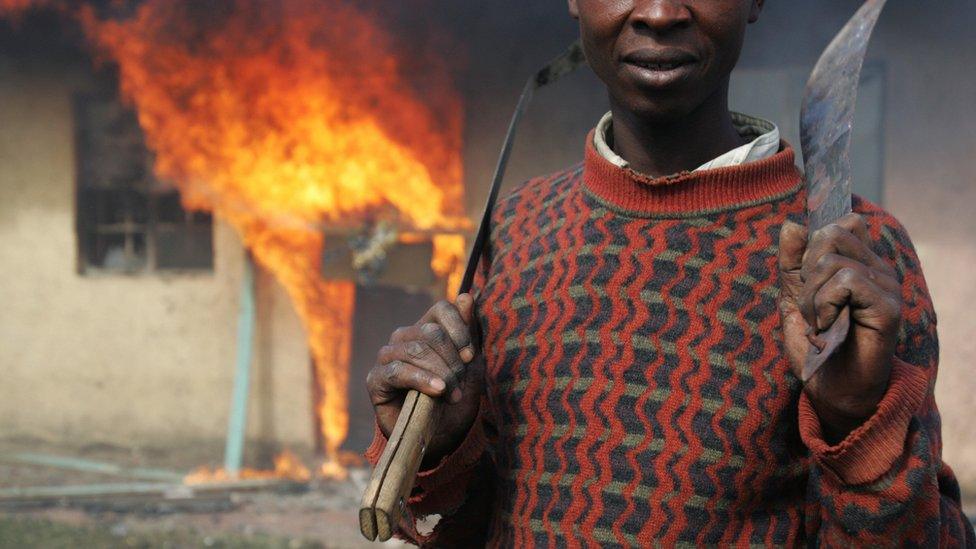
Hundreds were killed and thousands forced out of their homes after the 2007 post election violence
Ken Opalo, from Georgetown University in the US, says that the risk for violence is unlikely to be at the levels 10 years ago:
"I am not too worried about the national elections. The real action will likely be at the county level. There will most certainly be violence. But again, that will be more a reflection of what is at stake, rather than some descent into complete chaos and state failure."
This is a view shared by Nic Cheeseman, professor of Democracy at the UK's University of Birmingham and a columnist with Kenya's Daily Nation newspaper.
He says "disorderly primaries are a reason to be concerned, but that they may not lead to greater conflict come election day".
He notes that the 2013 elections passed relatively peacefully.
Mr Chesseman says that the way to address the cut-throat competition in political parties is to give ownership to party supporters:
"In the longer-term, a key change will be the transition from parties that are funded by their leaders to parties that are funded by their supporters.
"When that starts to happen, the balance of power within parties will start to shift - but that is a long way off," he says.
- Published22 April 2017
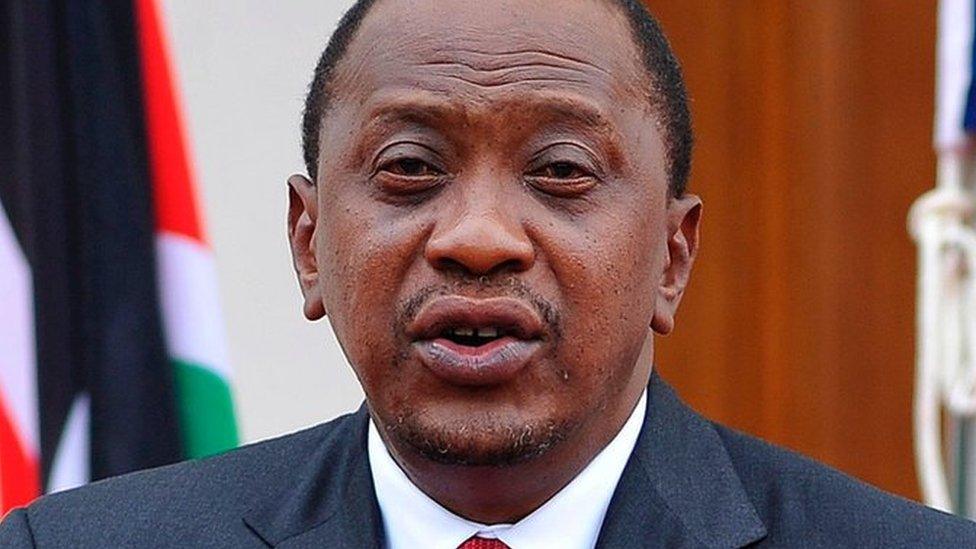
- Published2 April 2017
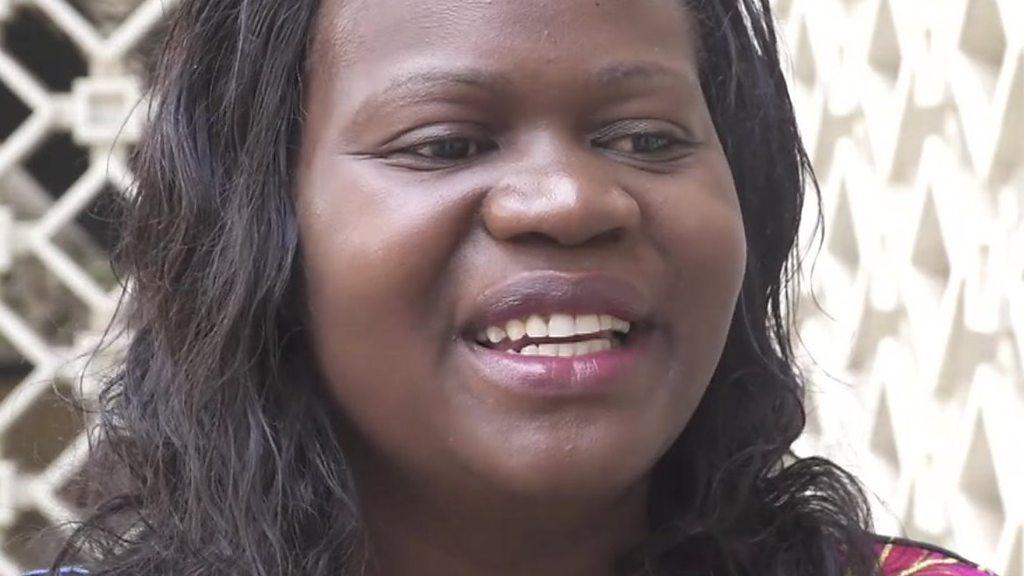
- Published9 January 2017

- Published4 July 2023
